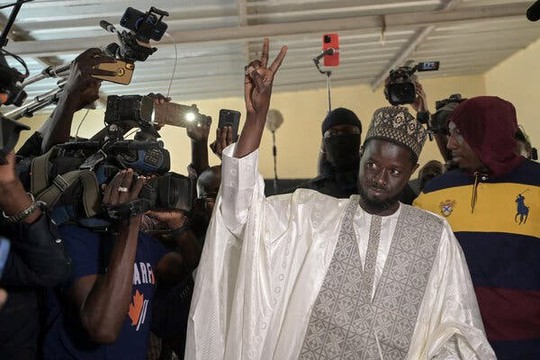Mr. Faye after casting his ballot at the École Ndiandiaye polling station in Ndiaganiao, Senegal.
Photo: Agence France-Presse
Bassirou Diomaye Faye, who turned 44 on Monday, was little known until he received the backing of Ousmane Sonko, Senegal’s most formidable opposition politician. Both men were released from jail only 10 days ago, The New York Times informs.
With the concession of his main rival, a young political outsider backed by a powerful opposition figure has won a surprise outright victory in Senegal’s presidential election only 10 days after being released from jail.
Bassirou Diomaye Faye is the anointed candidate of Senegal’s popular and controversial opposition politician Ousmane Sonko. Mr. Faye’s main rival, the governing party candidate Amadou Ba, conceded in a statement congratulating his rival on Monday for winning in the first round.
Mr. Faye, who celebrated his 44th birthday on Monday, will become the West African country’s youngest ever president, and the youngest elected president currently serving in Africa. (There are younger leaders, but they came to power by force.) He had been jailed on charges of defamation and contempt of court, and was awaiting trial.
“I wish him a lot of success, for the well-being of the Senegalese people,” Mr. Ba said in a statement released Monday afternoon that addressed Mr. Faye as president.
The national electoral commission has not yet announced the tally, but Mr. Ba’s concession followed reports by local media that Mr. Faye had won more than 50 percent of the vote, ruling out a runoff.
Mr. Faye and Mr. Sonko have captivated young people by excoriating political elites, pledging to renegotiate contracts with oil and gas companies, and promising “monetary sovereignty” — Senegal is one of 14 countries that use the CFA, a currency pegged to the euro and backed by France.
Mr. Ba, who stepped down as prime minister in order to campaign, was backed by Senegal’s president, Macky Sall. Mr. Sall had served two terms, and for years refused to say whether he would try for a third. He threw the country into chaos when he suddenly called off the election, which was supposed to happen in February, and then, almost as suddenly, changed course.
On Monday, Mr. Sall also congratulated Mr. Faye, saying that the smooth election was a “victory for Senegalese democracy” — a democracy that the outgoing president’s critics had accused him of trying to subvert.
Senegal, a mainly Muslim country of 17 million people, has a history of peaceful transfers of power since gaining independence from France in 1960.
But Mr. Faye was not the only winner. Many Senegalese casting their ballots for him saw him merely as a proxy for Mr. Sonko, 49, a fiery orator who was jailed and barred from running, and who tapped Mr. Faye to run in his place.
Mr. Faye is a former tax collector who was jailed on charges of defamation and contempt of court, after he accused magistrates of persecuting Mr. Sonko, who was himself convicted of defamation and, separately, of corrupting a minor, after he was accused of raping a young massage parlor employee.
Mr. Sonko has been eager to emphasize that a vote for Mr. Faye, known to many as Diomaye, was a vote for him.
“Diomaye is Sonko,” read ubiquitous posters bearing the two men’s youthful, glowing faces.
Mr. Faye has pledged to reduce presidential powers, to make the judiciary more independent, and to reform land ownership. He has also said he will “change the CFA” — the regional currency — though it is unclear whether he and Mr. Sonko intend to reform or replace it.
The election Sunday unspooled peacefully, with many voters arriving early at polling stations and lining up quietly to cast their ballots.
It was in stark contrast to the previous two months, during which it was often unclear whether the poll would take place at all.
In early February, Mr. Sall stunned the nation when he called off the election, saying that there were allegations of corruption that needed investigation at the constitutional council, the country’s highest court.
In the uproar that followed, the constitutional council ruled the delay unlawful, and Mr. Sall performed a U-turn. He agreed to hold the election quickly, and even released Mr. Sonko and Mr. Faye from jail, allowing them a quick-fire 10-day campaign…
Over the past five years Mr. Sonko has grown his following significantly by excoriating Senegal’s political elites and evoking the vague but charged concept of “sovereignty,” aiming his rhetoric at Senegal’s abundant youth — half of the population is under 19.
And the youth have responded. Thousands have taken to the streets in support of Mr. Sonko.
“Once we are in power there will be a lot of challenges,” Mr. Sonko said. “People will demand a lot from us, and we owe them a lot.”
read more in our Telegram-channel https://t.me/The_International_Affairs

 10:00 27.03.2024 •
10:00 27.03.2024 •























